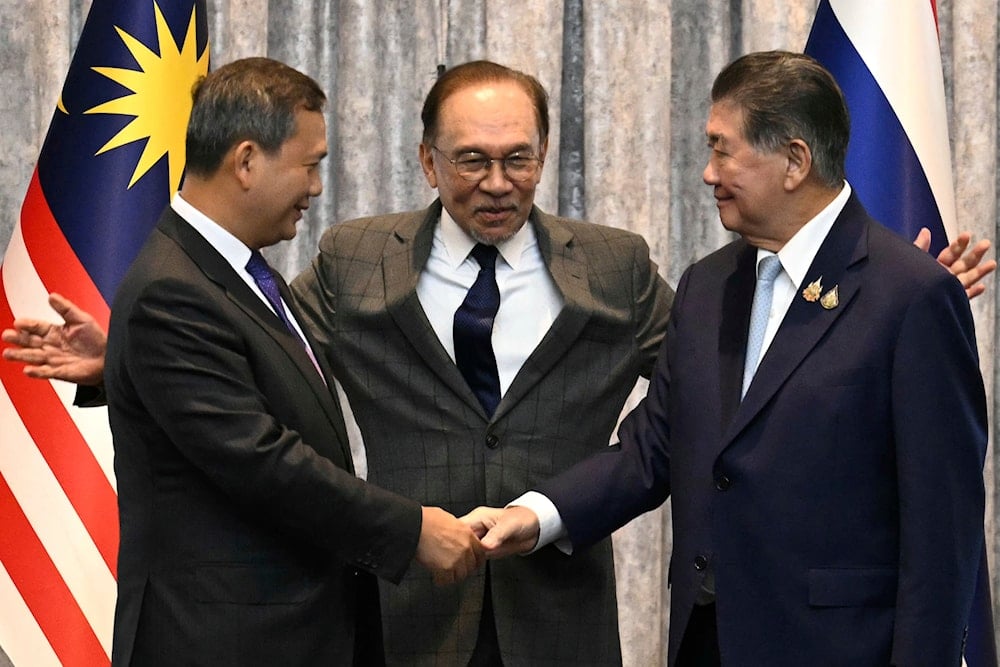Thailand, Cambodia agree to immediate ceasefire after deadly clashes
Cambodia and Thailand have agreed to an immediate and unconditional ceasefire after deadly clashes along their disputed border.
-

Cambodia's PM Hun Manet and Thailand's acting PM Phumtham Wechayachai shake hands as Malaysia's PM Anwar Ibrahim gestures after talks on a ceasefire between the two countries in Putrajaya, Malaysia, Monday, July 28, 2025 (AP)
Cambodia and Thailand have reached an agreement to implement an "immediate and unconditional ceasefire," which is set to take effect at midnight local time on Monday, after several days of intense clashes along the disputed border between the two countries.
Malaysian Prime Minister Anwar Ibrahim, who acted as a mediator in the peace talks in his capacity as the current chair of the Association of Southeast Asian Nations (ASEAN), announced that Cambodia and Thailand will hold a meeting involving regional commanders from both sides on Tuesday, July 29.
Cambodian Prime Minister Hun Manet and acting Thai Prime Minister Phumtham Wechayachai held a meeting at the Prime Minister’s official residence in Putrajaya, located just south of Malaysia’s capital, Kuala Lumpur.
During a joint news conference, the leaders announced that fighting would cease immediately, despite clashes persisting on Monday morning in the hours leading up to the peace talks, with Cambodian authorities claiming Thailand had struck at least two locations in the early hours and the Thai army reporting ongoing clashes in three provinces.
With the dispute over their border stretching back decades, both sides have exchanged accusations of initiating the latest border flare-up and blamed each other for the continued fighting, which Thai and Cambodian officials report has resulted in at least 35 deaths and over 200 injuries.
Border standoff
The clashes began with a fatal military skirmish in a disputed neutral zone on May 28, in which a Cambodian soldier was killed. Tensions escalated significantly on July 24, when landmines injured Thai troops and both militaries exchanged fire.
Thailand subsequently launched "Operation Yuttha Bodin," imposing martial law across eight border districts and shutting key crossings and temples, while Cambodia responded by banning Thai products and broadcasting content, escalating the diplomatic standoff further.
The violence has displaced more than 138,000 individuals from Thai border regions and 80,000 from Cambodia.
US steps in, threatens with trade deals
As the ceasefire negotiations progressed, both the United States and China extended offers to provide observers’ assistance, with US State Department officials already present on the ground Monday to support the talks, as confirmed by Secretary of State Marco Rubio.
After US President Donald Trump announced on Saturday that the Southeast Asian nations had agreed to ceasefire talks, while localized clashes persisted through the weekend, he revealed he had warned Thai and Cambodian leaders that ongoing border violence would jeopardize future trade deals with the US.
In a statement expressing gratitude to Malaysian Prime Minister Anwar Ibrahim, the Chinese government, and specifically Donald Trump for their support in the negotiation process, Cambodian Prime Minister Hun Manet emphasized that the ceasefire agreement marked "an important step towards reducing tensions and restoring peace and security" along the disputed border.
Adding to the diplomatic progress, Hun Manet revealed plans for the creation of a Cambodian-Thai General Boundary Committee, with Cambodia set to host its first meeting on August 4 as part of ongoing efforts to resolve the border dispute.

 3 Min Read
3 Min Read










